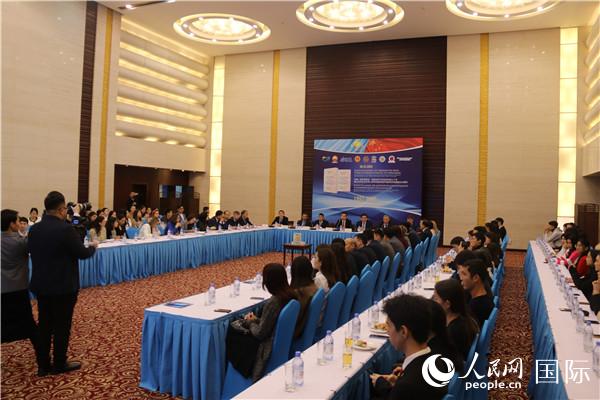This past week, Chinese national media reported on the establishment ceremony of the joint venture company between BGI Genomics and Uzbekistan, the granting of the zero-tariff regime for 98 percent of the current taxable products from 10 less-developed countries including Afghanistan, the unveiling of an anniversary book “Kazakhstan - China: three Decades of Good Neighborly and Mutually Beneficial Cooperation” in Astana, the second forum of “China + Central Asia” (C+C5) format taking place in Beijing, and the prospects of Kazakhstan to start transporting oil via BTC pipeline in 2023.

Image source: People's Daily
On November 5, BGI Genomics and the Ministry of Innovation and Development of Uzbekistan held a signing ceremony for the strategic cooperation memorandum and the establishment of the joint venture company Genscreen in Uzbekistan to help the local public healthcare system with prevention and control, precision medicine and other projects. (National Business Daily) Ambassador of Uzbekistan to China Farhod Arziev congratulated the establishment of the joint venture, saying that BGI Genomics is a leading life science and technology enterprise in China, and the establishment of the joint venture will help promote innovative development of medical services in Uzbekistan. BGI Genomics is the world’s leading integrated solutions provider of precision medicine, serving customers in more than 100 countries. It provides academic institutions, pharmaceutical companies, healthcare providers and other organizations with integrated genomic sequencing and proteomic services and solutions across a broad range of applications. (BGI)
Elsewhere, a statement was released by the Customs Tariff Commission of the State Council on Wednesday which indicates that China will grant zero-tariff treatment on 98 percent of currently taxable products from 10 less-developed countries, including Afghanistan (CNR). China will offer zero-tariff treatment gradually on 98 percent of taxable products originating in countries in this category that have established diplomatic relations with China according to the progress of the exchange of letters.
On November 9, Astana hosted the launching of a commemorative book titled “Kazakhstan – China; Three decades of good neighborly and mutually beneficial cooperation”, dedicated to the 30-year history of cooperation between Kazakhstan and China. (People's Daily) The event was jointly organized by the Center for Chinese Studies and Kazakhstan National Eurasian University, Kazakh Ablai khan University of International Relations and World Languages, and PetroChina Central Asia Company. Representatives from governments, think tanks, universities and media of the two countries jointly participated in the activities of the day in a combination of online and offline formats. The publishing house of the book is designed for diplomats, specialists and students in the field of international relations, oriental studies, and all those interested in current foreign policy and the development of Sino-Kazakh relations.
The second Forum of “China + Central Asia” (C+C5) was held in Beijing on November 8, with leading Chinese and Central Asian scholars exchanging their insights to set a course for a “new path to common development” (China news service) The scholars said that since the establishment of diplomatic ties 30 years ago, China and Central Asian countries have made remarkable achievements in developing their relations, setting an example of a new type of international relations featuring mutual respect, fairness, justice and win-win cooperation. Li Hui, the Special Representative of the Chinese Government for Eurasian Affairs, said that the forum fully demonstrates the strong resilience of China’s relations with Central Asian countries. Development is difficult without peace and prosperity is impossible without stability. Li Hui stressed the need to adhere to the mission of maintaining peace.
On November 10, Kazakhstan’s prime minister Alikhan Smailov informed reporters at a briefing after the Senate’s plenary session that “Kazakhstan will start oil transportation through Baku-Tbilisi-Ceyhan (BTC) pipeline starting from January 1, 2023”. (Jiemian Global) “Through the port of Baku, Kazakh oil can be transported via the Baku-Supsa and Baku-Batumi oil pipelines. There is also a railroad route from Atyrau towards Batumi and towards Uzbekistan, and the Chinese direction. Currently, we are working on expanding and raising oil export potential in these directions” Smailov added. “As for the Baku-Tbilisi-Ceyhan route, we have agreed on transportation of 1.5mln tons of oil beginning from January 1, 2023” said the Prime Minister, adding that later the volumes will be increased to 6 - 6.5mln tons.

